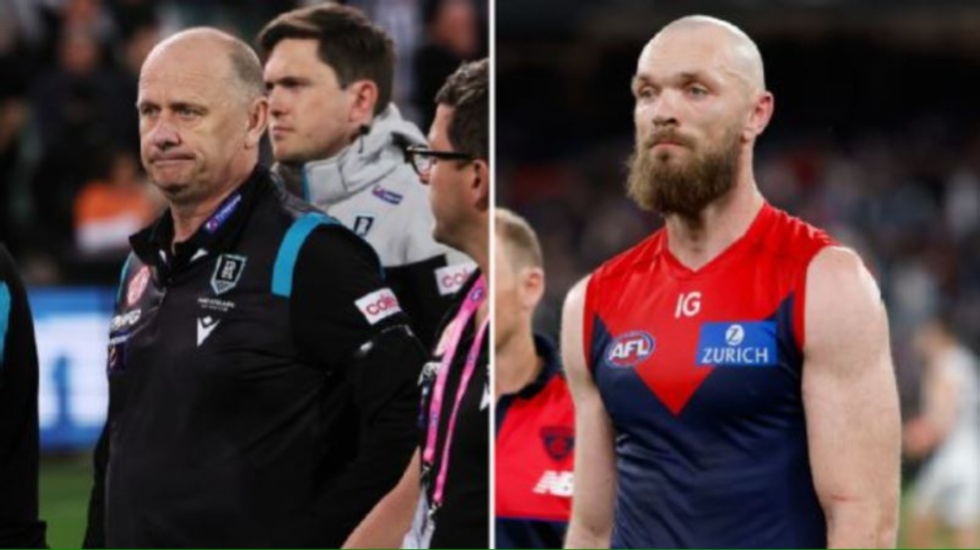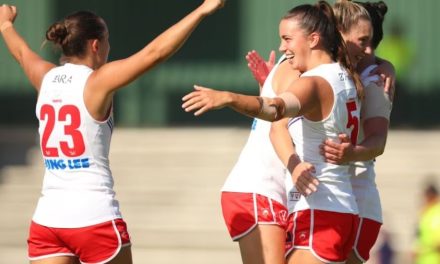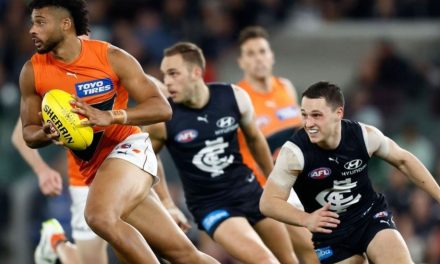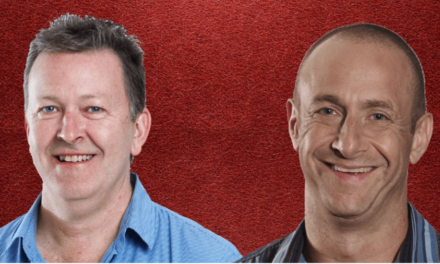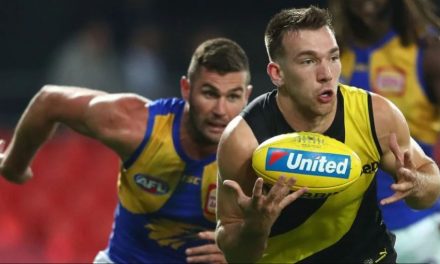Shattered: Port Adelaide coach Ken Hinkley and Melbourne skipper Max Gawn ponder their teams’ finals exit. Picture: ESPN
The single key statistic for me in what happens now to Melbourne and Port Adelaide isn’t so much related to either team’s AFL semi-final loss but in how dramatically the finals landscape has changed.
Under the current final eight system, we’ve now had 24 seasons of qualifying finals and semi-finals. Between 2000 and 2013, no fewer than 26 of 28 qualifying final losers rebounded to win their semis. Since then, it’s just 10 of 20, both the Demons and Power going out in straight sets.
What does that mean? Surely, it’s that the gap from top to bottom of the final eight has closed, that finals are even harder to win, and that the little things here or there, even a bit of fortune, can make a world of difference.
It’s worth Melbourne and Port Adelaide fans pondering that as they pick over the entrails of their team’s defeats. Because I’m not sure the level of angst about either necessarily matches the reality of their position. Particularly when it comes to the Dees.
Of course, the Demons shot themselves in the foot in not just one but two finals, losing both by a combined total of just nine points having booted a collectively ridiculously wasteful 16.28. But you also need a bit of luck on your side to win premierships, and this season Melbourne had precious little, particularly near goal.
Tom McDonald and Ben Brown were injured, out of sorts, or both. Then Bayley Fritsch got hurt. Then, just as Melbourne appeared to have crafted first one, then a second more-than-adequate back-up plan in attack with Harrison Petty and Jake Melksham, they suffered season-ending injuries. And just to rub salt in the wound, young gun Jacob van Rooyen got suspended.
Even then, the Dees still managed to find goals in their two finals out of Fritsch, Kysaiah Pickett and Joel Smith. Even then, they managed 18 scores to Collingwood’s 15 in the qualifying final and 26 to 18 against the Blues.
But the repeated disruptions to any sort of continuity of structure simply had to take a toll. On both efficiency and conversion. And Melbourne still was oh-so-close to winning either game. In fact, I’d go so far as to suggest had even one, let alone both Petty and Melksham stayed upright, the Dees might very well have ended up premiers.
On that basis, while the hand-wringing about Melbourne potentially squandering a golden era is understandable, I think it’s completely over the top.
The Demons were still a healthy enough sixth for points scored this year and defensively were ranked behind only St Kilda. They were ranked top six in five out of six midfield categories and were close to the best in the business in terms of occupying territory.
They had the second-most experienced games average in but were still youthful enough, with a handful of clubs still older and with more over 30s. They got valuable experience into the likes of Van Rooyen and Judd McVee, and even now-experienced premiership players like Trent Rivers and Tom Sparrow took steps forward.
PLEASE HELP US CONTINUE TO THRIVE BY BECOMING AN OFFICIAL FOOTYOLOGY PATRON. JUST CLICK THIS LINK.
Yes, another key forward should be a priority. But that may well be all that is needed for Melbourne to continue to push for a premiership for some time yet.
Port Adelaide doesn’t have some of those advantages. And its late-season demise was disappointing, no question. But, not for the first time, the torrents of criticism coming for Power coach Ken Hinkley from Port Adelaide people have many of us outside the tent scratching our heads.
This, remember was a season in which after just three games, pundits like former Port champion Warren Tredrea were calling for Hinkley’s head. The Power then peeled off 13 wins in a row.
What might have been undersold at the time, though, was how fine a line Port was walking. Six of those victories came by margins of 10 points or less. And it always looked vulnerable in defence, where it ranked only 12th for fewest points conceded.
Ditto midfield, where the youthful class of Zak Butters and Connor Rozee might have overshadowed Port’s relative lack of on-ball depth compared to rivals. The Power relied heavily on forward territory occupation. When Port’s midfielders couldn’t enough hands on the footy, like against the Giants on Saturday night, its backline was ruthlessly exposed for height, strength and class.
But those issues aren’t insurmountable. Certainly, a couple of key defenders like Esava Ratugolea and Brandon Zerk-Thatcher would make a huge difference. As would a couple more quality mids. And the Power do still have time on their side.
Even in the unlikely event of the 35-year-old Travis Boak playing on in 2024, Port had the third youngest list of this year’s top eight, Boak and the now-retired Tom Jonas two of only five over 30s.
Bottom line? There’s some issues with the list, but fixable issues. Coaching issues? Not from this vantage point. I think in 2023, Hinkley has done pretty well.
And a more fundamental lesson for both Melbourne and Port Adelaide out of the disappointment of the past few days comes in both last year’s premier, and perhaps this year’s.
Geelong famously just kept knocking on the door before finally crashing through the premiership barrier a year ago. And on Saturday, Brisbane plays its third preliminary final of the past four years after a fifth top-four finish.
The Lions just keep presenting. And maybe this is the year they get just a little more right and the footy gods are just a little more benevolent. That could be Brisbane’s story in 2023. And there’s no logical reason it still can’t be Melbourne’s or Port Adelaide’s 12 months from now.
This article first appeared at ESPN.

